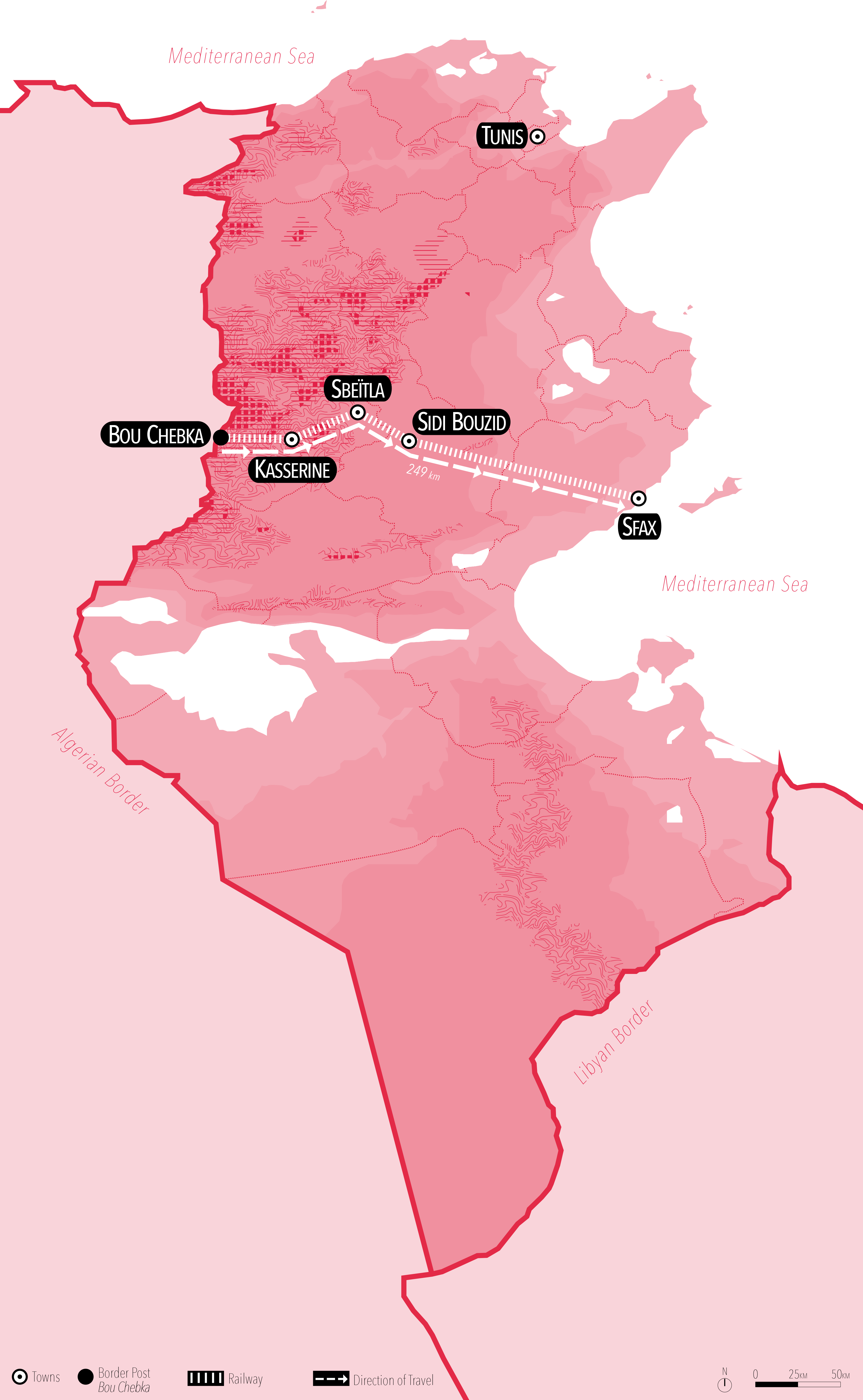At the age of 19, Kamal has already travelled for years, crossing several countries in Northern Africa since having left his native Cameroon. Using Tunisia as a stepping stone, with a better life in Europe in mind, he recalls the harsh and life-threatening conditions of his journey.
By Méline Laffabry (edited by Rogerio Simoes)
Kamal is not yet 20 years old. Nevertheless, he has already spent over 7 years on the exile route, in what he calls “clandestine” living. When we met him in August 2023, he had been in Tunis for a bit over a month. He recounts the borders, the difficulties, and the goals he never loses sight of.
“My name is Kamal. I am a migrant, and the situation is not easy.” Throughout the conversation, the 19-year-old paints a stark picture of exile. “I left Cameroon very young, at 12 or 13. I crossed Niger, Nigeria, Algeria, Morocco…” Sitting near the makeshift camp where he lives in the streets of Tunis, he shares his story.
Kano, Abuja, Sokoto, Zinder, Maradi, Oran, Tlemcen, Guezzam, Tamarasset, Assamakka, Tebessa—city names he traversed unfold, outlining his journey to the Tunisian capital. The path he describes, far from a straight line, is filled with obstacles, detours, back-and-forths, to the extent that even he loses track of them. He is sometimes unable to recall how long he stayed in a place. A constant in this uncertain journey: violence. The violence of the police, the trials to endure, and the ever-present threat of death.
“To cross the Niger-Algeria border, you have to walk through the desert. There’s no other option. The car drops you off 1,000 km from Algeria. We are in groups of 35, 40, 50, sometimes 70. It depends. I know many people who left and never gave a sign of life again. Those who survive this crossing, it’s Allah’s will. The majority of people die; bodies fall in front of you. It’s very difficult. You would like to help them, but you can’t. I can save my life, but not others’. I have to survive.”
Facing police violence is also a reality: “Many people have got their arms or legs broken, and women have miscarriages. When the Moroccan or Tunisian police arrest you, they beat you and strip you. They take your phones and bring you back to the other side of the border you just crossed. Some people are taken away and never seen again. At least the Algerian police only search you and even give you a bit of bread and water before returning you to the border.”

Kamal has endured all this with the goal of settling in Europe. But once reaching the Tunisian coast, one must embark on “flocas,” small fishing boats, in the hope of crossing the Mediterranean Sea.
The sea, Kamal has taken it. Once. “A boat sank next to us. You see people sinking, and you can do nothing. If you have a life jacket and lose it, it’s over for you too. Fortunately, our captain knew how to handle the helm. Because, when you leave from the beach, the sea is calm, but afterwards, it’s a mess. We tried to continue, but the engine stopped, and we had to call the Tunisian coast guards to come get us. It was in May 2023.”
Sometimes these events are so traumatic that some lose their sanity. Kamal recounts, “Some went crazy. Here, there’s one who went mad. He’s been through too much. He’s in the streets of Tunis, and people think he’s been mad from birth. But it’s everything he’s seen that made him mad. It’s hard to overcome certain stages. You lose courage. You think about giving up everything and starting from scratch.”
Despite all the trials and violence, starting from scratch is not an option for Kamal. “Reaching Europe is no longer a goal; it has become an obligation. I think about myself, my family, and that’s it. That’s why I took to the sea, even if it was very risky. I had no choice. Otherwise, what do I do? Do I stay here, sleeping on a mattress? What will my mum eat if I do that? And my little sister? I need her to go to school, to have access to the education I couldn’t have. I want to take her on carousel rides, help my mum, my parents, my two grandmothers.
The former goal which became an obligation also includes a dream. “I dream of visiting Marseille because, in my heart, I’ve always been a Marseillais. I’m a football fan. But after that, I want to go to Amsterdam and Berlin. I know the situation is complicated and it will be difficult. But I think about my mum and my little sister; they are my source of motivation. And I also want to do it for myself. To have a good quality of life, to grow, to start my own family.”
This article is part of a the multimedia series “Tunisia, land of Passage”, a project in collaboration with Specto Média. Each Tuesday, during six weeks, we will publish a podcast episode, a contextualisation article, a profile and an infography.
Listen to episode 1 below or click here.

This multimedia series is produced by Specto Média.
Author: Eléonore Plé
Investigation and production: Eléonore Plé
Sound production: Norma Suzanne
Graphic identity: Amandine Beghoul and Baptiste Cazaubon
French version dubbing: Yamane Mousli
English version dubbing: Isobel Coen and Julian Cola
Editing: Hugo Sterchi and Norma Suzanne
Recording studio: Radio M’S
To discover the series in French, visit Specto Media

